US Sets $15m Reward For Information On IRGC Financial Network
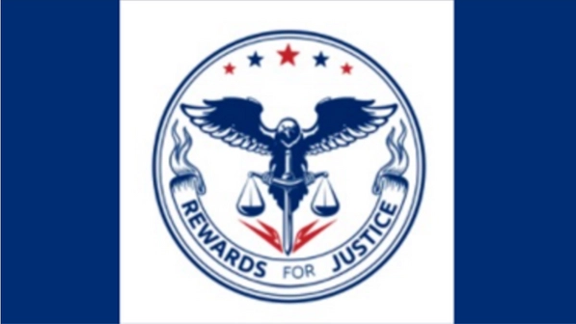
The United States says it has set a reward of up to $15 million for receiving information on the illicit financial network of Iran's Revolutionary Guard (IRGC).

The United States says it has set a reward of up to $15 million for receiving information on the illicit financial network of Iran's Revolutionary Guard (IRGC).
The "Reward for Justice" program affiliated with the US State Department tweeted Saturday that anyone who has information on the IRGC’s financial network can win the reward.
“The IRGC and its branch, the IRGC Qods-Force, conduct and support terrorist activities across the world,” reads the tweet.
It also added that the IRGC used numerous financial mechanisms to fund its activities, including front companies and other entities that help it bypass US and international sanctions.
The Biden administration has already issued dozens of sanction designations on companies and individuals affiliated with the Revolutionary Guard in several countries.
The program has called on people with any information on such activities to share it via WhatsApp, Telegram, or Signal to win a reward.
The United States designated the IRGC as a global terrorist organization in 2019. It has carried out multiple cyber-attacks and threats to the lives of Iranians abroad, including staff at Iran International based in the UK.
The European Parliament overwhelmingly passed a resolution on January 19 calling on the EU and member states to designate the IRGC, however, several states including Germany fear designation will close the window of diplomacy regarding Iran's nuclear program may be closed.
Designating the IRGC as a terrorist group in Europe would mean that it would become a criminal offence to belong to the group, attend its meetings, and carry its logo in public.

The 15-percent discount Iran offers for its exported oil is not a very high percentage, the chairman of oil and gas exporters union Hamid Hosseini says.
He explained that Russia offers large discounts to China and India to offload its oil that used to be exported to Europe and elsewhere before Western sanctions were imposed after the invasion of Ukraine.
Iran is in the same situation, having been sanctioned by the United States in 2018, after former President Donald Trump withdrew from the JCPOA nuclear deal, demanding many concessions from Tehran.
However, Iran has gradually increased oil exports to China since the Biden administration assumed office and began negotiations to reverse Trump’s decision and revive the JCPOA.
Consequently, Iranians wonder why the government is facing a financial crisis and the national currency has lost half of its value since mid-2020 if oil exports to China have increased.
A news website in Tehran asked this week why the budget is in such a bad shape if the government claims ever-increasing oil shipments to China. Hosseini said that in the past two years daily oil exports have increased by 700,000 barrels.
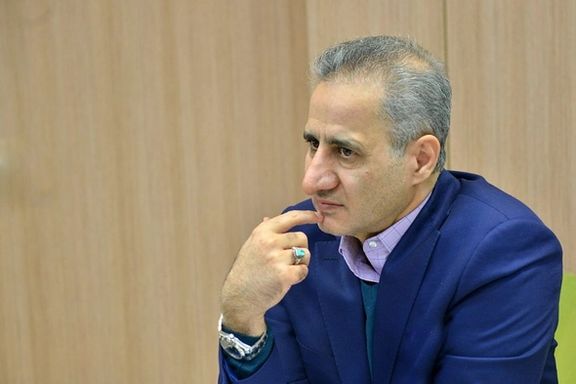
If Iran is shipping a daily average of 850,000 barrels of crude to China at 15 percent discount, it is earning around $65-68 per barrel at current prices. A simple calculation would show that Iran earns around $20 billion annually from oil sales to China.
This is a far cry from $100 billion a year it was earning around 2010, when oil was trading well above $100 a barrel, there was also no discount, and Iran was exporting more than 2.2 million barrels per day, compared to today’s less than one million barrels.
Another factor is that $100 billion in 2010 equals at least $135 billion in 2022 dollars, and global inflation has remained high in 2023.
Iran also ships oil to Venezuela and Syria, but there it hardly earns any money as the relationship is more political and the oil shipments more of a foreign aid scheme.
Therefore, after the United States imposed sanctions in 2018 and reduced Iran’s oil exports, revenues are now less than one-sixth of a decade ago.
Other factors also exist. Different Iranian politicians and officials have pointed out that to repatriate the funds from oil exports, Tehran must use middlemen to circumvent US banking sanctions imposed on third parties, and the amount it actually receives is 15-40 percent less. This adds to the loss incurred by the 15-percent price discount.
Not only oil export revenues are woefully in adequate for Iran’s oil-dependent government and economy, but the energy sector itself is suffering from years of neglect in terms of necessary investments, to the tune of more than $200 billion.
Hosseini expressed hope that with the recent agreement with Saudi Arabia to restore diplomatic relations, perhaps in the future Riyadh would invest in Iran’s oil and gas sector.
Government-controlled media and some officials have also raised expectations that trade can increase with Saudi Arabia in the coming months and perhaps Riyadh would make investments.
However, any foreign investment first needs lifting of US sanctions and for now there is no prospect for Iran reaching a new nuclear agreement with the United States.
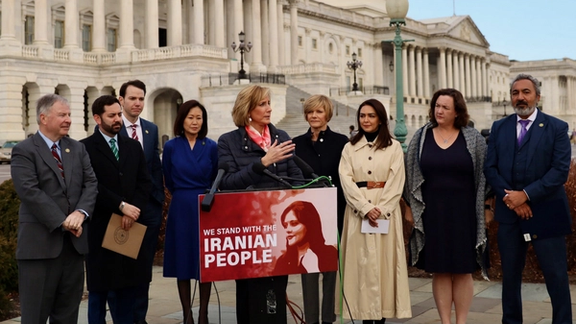
US Republican lawmaker Claudia Tenney has released a comprehensive report on the activities of Iran’s Revolutionary Guards, calling on US allies to designate the IRGC as a terrorist group.
Representative Tenney (Rep-NY) released the reportaccompanied by a bi-partisan resolution on Thursday, detailing the IRGC’s “terrorist activities around the world” and urging Washington’s partners and allies to join the United States in labeling the body as a terrorist organization.
Several groups, including the Jewish Institute for National Security of America, United Against Nuclear Iran, and Foundation for Defense of Democracies, contributed to the 20-page report.
Former US officials, namely former Secretary of State Mike Pompeo, former Deputy National Security Advisor Victoria Coates and former Special Representative for Iran Elliott Abrams, also shared their views and experiences about the IRGC in the report.
“Combatting the IRGC is one of the most urgent national security agenda items today,” said Congresswoman Tenney. “Congress is united in opposing the IRGC’s terror campaign. This designation will increase pressure and send a clear message to the Islamic Republic that its terror campaigns must stop,” she noted.
Tenney’s bipartisan resolution specifically urges the European Union to expeditiously designate the IRGC as a terrorist organization under the European Union’s Common Position 931.
The former US envoy on Iran, Abrams, said in the report: “The IRGC is a global threat that requires a global response. If the IRGC can run free in Europe and Asia it can threaten Americans and our allies, move more money and weapons, and build its strength. We need to press every friendly nation to close the gaps and loopholes that allow the IRGC to survive and thrive as a danger to all of us—and as the main oppressor of the Iranian people.”
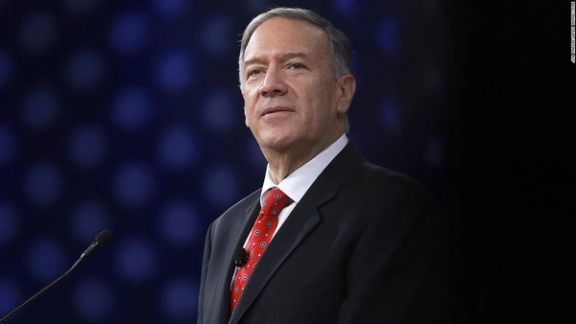
Pompeo, a vocal critic of Iran, said: “Iran’s Islamic Revolutionary Guard Corps is a militant terrorist organization that answers only to Supreme Leader Khamenei, who uses the IRGC to spread terror and mayhem in the name of his theocratic regime."
The report breaks down the threats into domestic, as it crushes voices of dissent in the dictatorship, and regional and global threats.
The comprehensive report lists Middle East states where the militia is carrying out its operations, funding other affiliated leaders and groups in internal struggles or civil wars.
“The IRGC funds belligerents that support the Iranian regime and promote similar schools of extremist religious thought,” the report stated, enumerating the group’s activities in Iraq, Syria, Yemen, and Lebanon, as well as Gaza, Judea, and Samaria – which encompasses the entire West Bank.
By attacking dissidents directly or working through proxies to fuel terrorism, the threats go far beyond the Middle East, acknowledged the authors who went on to list some of the terrorist acts by the IRGC, including the attack on the Asociación Mutual Israelita Argentina (AMIA) Jewish Community Center in Buenos Aires in July 1994, assassinations at Mykonos Restaurant in Germany in September 1992, and plotting to assassinate former National Security Advisor John Bolton in August 2022.
The US lawmaker’s report also points to the Islamic Republic’s supply of weapons for the Russian invasion of Ukraine as another global threat posed by the IRGC. “Russia and Iran announced a $1 billion deal to build a factory in Russia to produce up to 6,000 Iranian-designed drones to use against Ukraine in Russia’s war of aggression,” the report claimed.
The international community must unite against the threat, wrote Michael Makovsky, the CEO of the Jewish Institute for National Security of America (JINSA).
“Today, the IRGC is the most dangerous terrorist group on the planet, with the history, capability, and intention to conduct attacks across six continents,” he said.
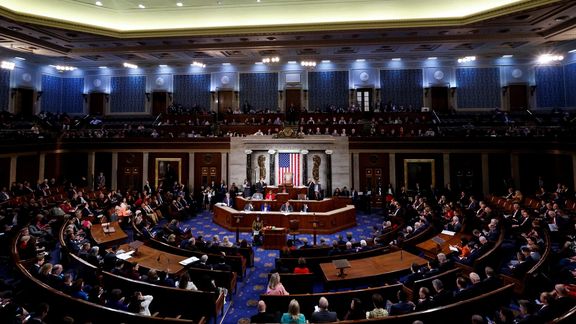
More than 130 Democratic and Republican Congresspeople issued a letter Monday asking the European Union to designate Iran’s IRGC as a terrorist organization.
Referring to the multiple threats the group has posed internationally, including the attempted murder of author Salman Rushdie in the US and a plot to murder ex-Trump aide John Bolton, the group claimed that Iran remains a “leading state sponsor of terror”.
Proscribed by the US in 2019 under the Trump administration, the IRGC has been operating for decades across the EU, most recently, including a plot to murder Iran International journalists in London.
A recent study by the Combating Terrorism Center at West Point showed that in the last five years Iran has instigated at least 33 plots to surveil, abduct, or assassinate citizens in Europe,” members of the US House of Representatives wrote in their letter.
Iranian communities in Europe and North America and several European and EU politicians and officials have been demanding that the EU and its member states should act to proscribe the Islamic Revolution Guard Corps (IRGC) in the aftermath of a deadly crackdown on protesters since September 2022.
Security forces under the command of the IRGC have killed well over 500 civilians during anti-regime protests, seriously injured hundreds of others and arrested more than 20,000. Among the detainees are hundreds of school children, women activists, journalists and artists.
The issue of adding the IRGC to the list of Europe’s terrorist entities became a rallying point for the Iranian diaspora, which launched online campaigns and held a large protest in Strasbourg on January 16 to lobby the European Parliament for passing the resolution.
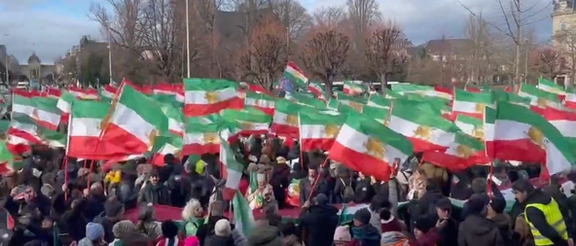
The European Parliament on January 19 overwhelmingly passed a resolution calling on the EU and its member states to designate the IRGC as a terrorist group, but its resolution is not binding for the bloc’s executive bodies.
While several key EU countries, such as Germany and France have been saying they are looking into the matter, the European Union foreign policy chief Josep Borrell has argued that such a step hinges on a legal determination by an EU member state court. However, critics believe the EU does not want to offend the Iranian regime, still hoping to open the way to a nuclear agreement with Tehran.
Congresswoman Kathy Manning (D-NC), Vice Ranking member of the House Foreign Affairs Committee, Chair of the Europe Subcommittee of the House Foreign Affairs Committee and Congressman Bill Keating (D-MA), Ranking Member of the Europe Subcommittee led the bipartisan letter.
The position of the Biden administration on the issue is not clear. There have been reports that Washington has asked the United Kingdom not to designate the IRGC, to keep channels open with Tehran with the hope of reaching a nuclear deal.
The EU and some member states have imposed several rounds of sanctions on Iranian entities and individuals also linked with the Revolutionary Guard in the past seven months, but designating the organization as a terrorist group has not happened.
“We strongly urge you, and your foreign affairs ministerial colleagues, to make the decision to fully sanction, penalize and delegitimize the IRGC, to help prevent them from further threatening democracy and freedom in the United States, Europe, and around the world,” the bipartisan group of lawmakers wrote to Borrell.
When the US designated the IRGC, Iranian negotiators part of the nuclear talks were demanding that the US should reverse its decision. The negotiations that the Biden administration began in April 2021 ended in a deadlock last September and since, the President has stuck by the designation.
In the wake of the collapse, the Islamic Republic has since supplied suicide drones to Russia that have been used against civilian targets in Ukraine, angering European countries and triggering several more rounds of sanctions.

A moderate Iranian news website claims the Islamic Republic’s frozen assets in China are worth between $22 and $30 billion, suggesting that even Tehran’s close ally would not pay back its debts.
According to Rouydad 24, which was temporarily blocked by the country’s authorities for allegedly anti-regime sentiment in March, China is one of Iran's biggest debtors while Iraq owes Tehran about $11 billion for electricity and gas exports. South Korea has about $7 billion of Iran’s oil revenues frozen.
All these countries are unable to unfreeze the Islamic Republic’s money because the regime is under several rounds of US sanctions, and they would not jeopardize their ties with Washington for the sake of paying Iran’s debts.
The issue of Iran’s blocked funds has come to fore again following the International Court of Justice (ICE) rejection last week of Tehran’s legal bid to free up $1.75 billion of its assets frozen by US court rulings. The world court said that it did not have jurisdiction to rule on the Iranian claim linked to the assets of the Central Bank of Iran (CBI) that were blocked to be paid in compensation to victims of a 1983 bombing in Lebanon and other attacks linked to the Islamic Republic.
In a report published in 2022, the International Monetary Fund reported that by the end of April 2020, the amount of Iran's blocked assets around the world had reached $115.4 billion. And according to Alena Douhan, the UN Special Rapporteur on Unilateral Coercive Measures who visited Iran in May 2022, the Islamic Republic has between $100 billion and $120 billion trapped in foreign accounts because of US sanctions.
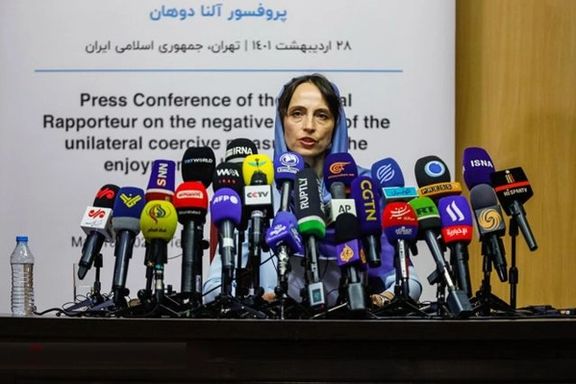
“I urge states to unfreeze the assets of the Central Bank of Iran in accordance with customary norms of international law,” Douhan said in Tehran, drawing criticism by several human rights defenders, such as Iranian Nobel Peace Prize Laureate Shirin Ebadi, and London-based human rights lawyer Shadi Sadr.
Sadr called Douhan a “mouthpiece for the Islamic Republic” and “a disgrace to UN human rights experts.” The role of this rapporteur was created at the UN Human Rights Council by the adoption of a resolution proposed by Iran on behalf of Non-Aligned Movement in 2014, and is the only UN rapporteur who was allowed to visit the country in about 20 years.
Iran’s properties abroad can be divided into two general categories: the state properties that are usually managed under the supervision of the Central Bank of Iran, and the properties of companies that are linked to the government, thus considered state-owned.
Moreover, Iran has shares in some companies such as Germany’s Mercedes-Benz, France’s Eurodif -- a multinational nuclear enrichment facility – and Aqaba oil pipeline in Jordan bought during the Pahlavi era. The country also owns lands and buildings such as the historical building of the Iranian Embassy in Washington and properties in the US and Canada belonging to the Alavi Foundation, the successor organization to the Pahlavi Foundation that was a nonprofit group used by Shah Mohammad Reza Pahlavi to advance Iran's charitable interests.
The Islamic Republic – especially since the administration of President Ebrahim Raisi began -- claims that it is selling more oil, gas, and electricity but apparently the revenues are piling up in Chinese, Iraqi or other countries’ banks. Unless the regime finds a way to revive its 2015 nuclear deal with world powers, it is not expected that Tehran would access its frozen funds, especially now that prominent opposition figures have been calling on world countries to allow the funds to be used to support the striking workers of the energy industry in the country.
Axios reported on Monday that the Biden Administration has been entertaining the idea of a partial nuclear deal with Iran and has discussed it with allies, a claim that seems very disappointing for the Iranian protesters who have been holding regular anti-regime rallies since September, when the regime’s hijab police beat to death 22-year-old Mahsa Amini.
The only other way that the Islamic Republic can push other countries to unblock the assets is through its policy of hostage taking, something that is historically the source of contention between the Islamic Republic and the US as well as other countries. Time and again, reports surface in Iranian media that some of the frozen funds will be imminently freed in exchange for Iran releasing one or some of the foreign nationals it has imprisoned during the years on trumped up charges such as espionage.
The editor of hardliner daily Kayhan, Hossein Shariatmadari, who is known to be the unofficial mouthpiece of the Supreme Leader, keeps suggesting that Iran should block the entry of ships and oil tankers into the Persian Gulf via the Strait of Hormuz to put pressure on the countries blocking the regime’s money to repatriate Iran's oil money.
What happens from here is unclear, but Iran is finding that even its allies will not make exceptions for its ever increasing debts.
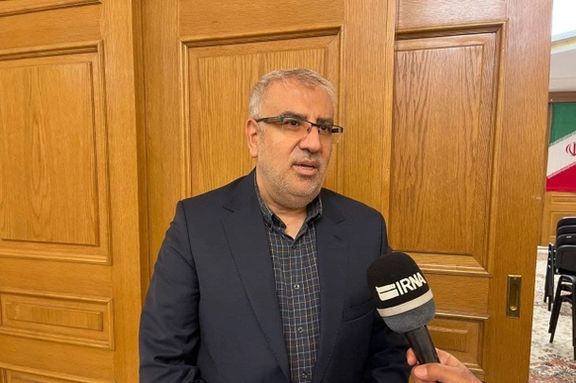
Iran’s Oil Minister Javad Owji has said that Iran does not receive cash for its natural gas exports to Iraq and all proceeds can only be used for importing medicines and essential goods.
Speaking on the sidelines of a cabinet meeting on Wednesday, Owji said that payments are deposited in the Trade Bank of Iraq and then spent on buying medications and “essential goods”, which usually mean food and animal feed.
Iraq and other countries stopped banking transactions with Iran after the United States withdrew in 2018 from nuclear accord with Iran known as the JCPOA and imposed sanctions. China, South Korea, India and others owe tens of billions of dollars to Iran for their oil imports.
FarazDaily news website in Tehran pointed out Thursday that President Ebrahim Raisi’s government in the past was claiming that it was receiving all the proceeds form gas and electricity exports to Iraq, and now admits that it never received any cash.
Iranian officials have recently mentioned widely differing amounts of Iraqi debts, ranging from $11 billion to nearly $20 billion. Iran has been lobbying Iraq to transfer cash to Tehran, as government finances and its currency, rial, face dire conditions. The US dollar has doubled in value in one year in Tehran’s official and non-official currency markets.
Rial’s fall directly leads to more expensive imports of food and other goods, fueling Iran’s inflation rate, which stands above 50 percent.
There were reports in March that the Biden Administration had approved of a $500 million payment by Iraq, but so far it has not been officially confirmed.